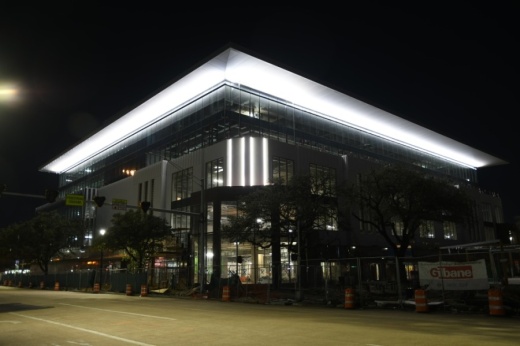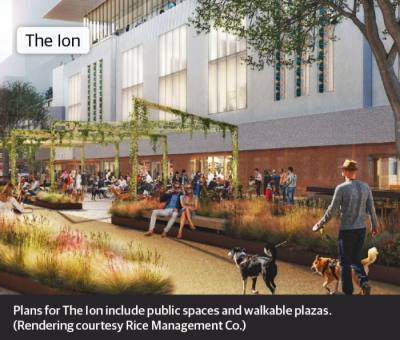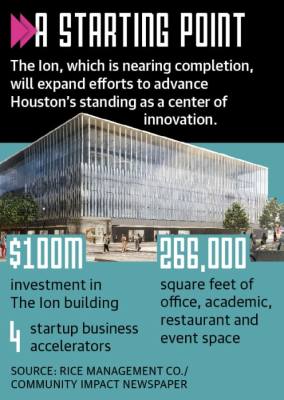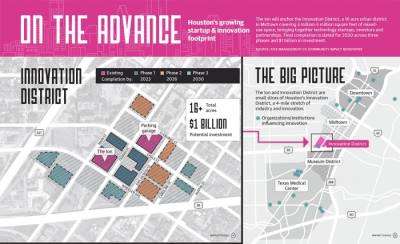“I told myself, ‘I’ll make some online videos, these online lesson plans kids can take home,’” Thomas said. “It just kept leading to scale. And when I started looking at how you can scale any initiative, technology is really that catalyst that allows for that scale.”
That realization pushed Thomas on a journey to learn coding and programming, eventually gaining years of experience working as a software engineer. His next passion was to develop an app that could connect nonprofits or individuals with needs to locally available resources on the ground.
Today, the app is reality, and Thomas is a founder and CEO, thanks to an accelerator program hosted by The Ion, Houston’s latest effort to create a space for breakthrough technology companies and nurture a competitive startup culture.
“We came in with this tech that somewhat worked—it was early—but we walked out of there with a cohesion and brevity of mission,” Thomas said. “We also walked out of there with great mentors.”
Thomas is one success story of many that project planners for The Ion promise to deliver as its 266,000-square-foot building nears completion in Houston’s Midtown, which is expected to bring to life a $1 billion Innovation District over the next decade.
While there is much to be gained, residents in the neighboring Third Ward said they are worried they will lose out in the process.
“We have been for this development from the very start. I think innovation is totally necessary for the Houston economy,” said Uyiosa Elegon, an organizer for the Houston Coalition for Equitable Development without Displacement, representing over 30 community stakeholder groups. “We can bring in Microsoft; we can bring in any tech company into this area, but honestly we still see rising inequities.”
Big picture
Beyond a building, The Ion promises to offer a lineup of accelerators designed to ramp up technology product development, along with workforce training opportunities and discussions designed to bring together new ideas.
To accomplish this, The Ion has an academic network of 10 higher education institutions and several corporate partners to bring educational events and demonstrations to students and faculty, along with startup accelerator programs.
With backing from corporate partners such as Microsoft and Chevron, The Ion and the Innovation District add to an ecosystem known for its collaboration, including developments in medical science, green energy and aerospace, said Susan Davenport, the Greater Houston Partnership’s senior vice president and chief economic development officer.
“You can see blossoming this opportunity to exponentially increase all of our innovation work,” Davenport said.
The Ion and its forthcoming 16-acre Innovation District will join what the partnership calls the Innovation Corridor, a 4-mile-long stretch of Main Street from the Texas Medical Center to downtown, which includes other startup-focused organizations such as TMC3, TMCx, the TMC Innovation Institute, Rice University’s OwlSpark, Accenture Houston Innovation Hub, Houston Exponential and MassChallenge, among others.
“It’s just the perfect blend of this innovation environment that they’ve created,” Davenport said. “All of the interested parties can come together efficiently and share ideas. It makes for a richer innovation economy. Those ideas will germinate out into the corporate infrastructure that’s already in place.”
Targeted opportunities
The Ion planners also hope to take advantage of Houston’s diversity, leveraging grant funding to advance founders from underrepresented communities.
“It was always something we needed to do,” said Jan Odegard, The Ion’s interim executive director. “I think that opportunity came when we worked and got the federal grant that helped us amplify that effort. It also allowed us to partner with DivInc and NASA.”
Houston, one of the most diverse cities in the country, ranks fifth in the nation when it comes to minority-owned startups, according to an analysis of U.S. Census Bureau data by the financial tech company Self. In total, 5,600 startups in the Houston metro region are minority owned—or about 30% of all companies less than two years old—compared to 46% in the San Jose, California, area.
The four accelerators at The Ion—structured programs designed to transform an idea into a tangible startup business—target areas such as smart cities, clean energy and aerospace, while another is focused entirely on minority founders. Selected accelerator participants get access to experts, mentors and expertise designed to get firms market and investment ready.
“To a large degree, the focus areas are designed so that they have an impact on certain things,” Odegard said.
Thomas, with his company Umanity, graduated in December 2019 along with the first cohort in the Ion’s Smart Cities accelerator. The company now has contracts with organizations throughout Texas, Ohio, Maryland and Nashville with an expansion planned for the end of summer.
Despite his success, Thomas said more needs to be done.
“I think this is a great first step, addressing that there is this discrepancy,” said Thomas, who is Black. “I think the next step is not just having a woman- or Black-focused founder accelerator, but addressing why the people that are handing out the money are more homogenous than others.”
Equitable growth
Rice Management Co., the overseers of the Rice University endowment, envisions an Innovation District comprising 16 acres in Midtown, just north of I-69 at Main Street.
The district’s master plan calls for 3 million to 5 million square feet of office, retail and residential space. However, the entire vision could also require about $1 billion in investment and take a decade to complete.
“We’re largely going to let the market determine what kind of programming goes into those future buildings,” said Ryan LeVasseur, managing director of direct real estate for Rice Management Co. “For it to be a true Innovation District, we will look to include commercial office buildings in the next phase of development, which we hope to kick off this year or next year.”
As the sole landowner, Rice Management Co. can drive the district’s build out, but Third Ward residents have been raising concerns and seeking involvement since 2019.
HCEDD wants Rice to sign on to a community benefits agreement with provisions to protect the neighborhood from gentrification.
In January 2020, Mayor Sylvester Turner said the city would lead negotiations on an arrangement between the broader community and Rice, however HCEDD prefers an exclusive, direct agreement.
“We see the history of inequity that the city stewarded for many decades, and we want to make a commitment to our community that we will do our very best to come to a contractual agreement,” Elegon said.
Sam Dike, manager of strategic initiatives for Rice Management Co., defended its community engagement approach and said the city can act as a good faith partner.
“It has never been about whether Rice will make commitments or not; it’s been about who will be part of a contractual agreement,” Dike said.
HCEDD is taking its case to the Midtown Redevelopment Authority, an entity that oversees how property tax growth can be invested in the area. The authority will soon vote on $75 million in infrastructure for the Innovation District. HCEDD wants the funds to come with a provision that a community benefits agreement is done with the group exclusively.
“This is the one place where it is economically diverse,” said Third Ward resident Secunda Joseph. “Communities have been longing for development. They just want it to actually benefit the people that live there.”
Elegon said The Ion’s promises to invest in innovation, workforce development and equity would carry more weight if the community had a direct say over the agreement.
“If I go to any bank to get a small-business loan, they ask questions about my ability to repay the loan, and I have the burden of proof,” Elegon said. “Rice Management Co. has had the burden of proof the entire time and has not had the ability to prove whether they can go through any sort of equitable process.”
Emma Whalen contributed to this report.









